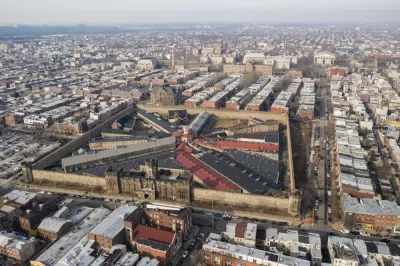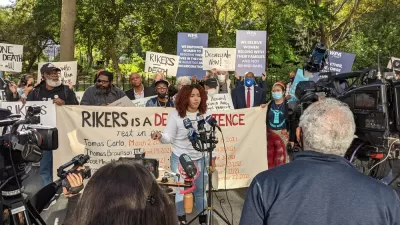Advocates in the design industries have been pushing for years for the American Institute of Architects to take a stance on how prisons are designed.

Jonathan Hilburg reports that the national branch of the American Institute of Architects (AIA) has updated its code of ethics to "prohibit the design of spaces intended for execution, torture and prolonged solitary confinement," adopting the change on December 10.
"Interestingly enough, the AIA has framed the decision as one not just of social justice but of specifically addressing racism in the built environment, acknowledging the disproportionate rates that minorities in America are subject to these spaces," explains Hilburg.
The source article includes more insight into the details of the AIA's new stance on prison reform, which has grown out of the public response to the murder of George Floyd and the Black Lives Matter protests that have continued around the country throughout the year.
FULL STORY: The AIA updates its code of ethics, prohibits members from designing torture or execution chambers

Maui's Vacation Rental Debate Turns Ugly
Verbal attacks, misinformation campaigns and fistfights plague a high-stakes debate to convert thousands of vacation rentals into long-term housing.

Planetizen Federal Action Tracker
A weekly monitor of how Trump’s orders and actions are impacting planners and planning in America.

In Urban Planning, AI Prompting Could be the New Design Thinking
Creativity has long been key to great urban design. What if we see AI as our new creative partner?

Portland Raises Parking Fees to Pay for Street Maintenance
The city is struggling to bridge a massive budget gap at the Bureau of Transportation, which largely depleted its reserves during the Civd-19 pandemic.

Spokane Mayor Introduces Housing Reforms Package
Mayor Lisa Brown’s proposals include deferring or waiving some development fees to encourage more affordable housing development.

Houston Mayor Kills Another Bike Lane
The mayor rejected a proposed bike lane in the Montrose district in keeping with his pledge to maintain car lanes.
Urban Design for Planners 1: Software Tools
This six-course series explores essential urban design concepts using open source software and equips planners with the tools they need to participate fully in the urban design process.
Planning for Universal Design
Learn the tools for implementing Universal Design in planning regulations.
Gallatin County Department of Planning & Community Development
Heyer Gruel & Associates PA
JM Goldson LLC
City of Camden Redevelopment Agency
City of Astoria
Transportation Research & Education Center (TREC) at Portland State University
Jefferson Parish Government
Camden Redevelopment Agency
City of Claremont





























